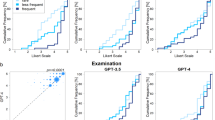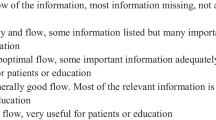Abstract
We aimed to assess Large Language Models (LLMs)—ChatGPT 3.5–4, BARD, and Bing—in their accuracy and completeness when answering Methotrexate (MTX) related questions for treating rheumatoid arthritis. We employed 23 questions from an earlier study related to MTX concerns. These questions were entered into the LLMs, and the responses generated by each model were evaluated by two reviewers using Likert scales to assess accuracy and completeness. The GPT models achieved a 100% correct answer rate, while BARD and Bing scored 73.91%. In terms of accuracy of the outputs (completely correct responses), GPT-4 achieved a score of 100%, GPT 3.5 secured 86.96%, and BARD and Bing each scored 60.87%. BARD produced 17.39% incorrect responses and 8.7% non-responses, while Bing recorded 13.04% incorrect and 13.04% non-responses. The ChatGPT models produced significantly more accurate responses than Bing for the “mechanism of action” category, and GPT-4 model showed significantly higher accuracy than BARD in the “side effects” category. There were no statistically significant differences among the models for the “lifestyle” category. GPT-4 achieved a comprehensive output of 100%, followed by GPT-3.5 at 86.96%, BARD at 60.86%, and Bing at 0%. In the “mechanism of action” category, both ChatGPT models and BARD produced significantly more comprehensive outputs than Bing. For the “side effects” and “lifestyle” categories, the ChatGPT models showed significantly higher completeness than Bing. The GPT models, particularly GPT 4, demonstrated superior performance in providing accurate and comprehensive patient information about MTX use. However, the study also identified inaccuracies and shortcomings in the generated responses.


Similar content being viewed by others
Data availability
The datasets used and/or analysed during the current study are available from the corresponding author on reasonable request.
References
Cronstein BN (1997) The mechanism of action of methotrexate. Rheumatic Dis Clin N Am 23:739–755. https://doi.org/10.1016/S0889-857X(05)70358-6
Brown PM, Pratt AG, Isaacs JD (2016) Mechanism of action of methotrexate in rheumatoid arthritis, and the search for biomarkers. Nat Rev Rheumatol 12:731–742. https://doi.org/10.1038/nrrheum.2016.175
Bedoui Y, Guillot X, Sélambarom J et al (2019) Methotrexate an old drug with new tricks. Int J Mol Sci 20:5023. https://doi.org/10.3390/ijms20205023
García-González CM, Baker J (2022) Treatment of early rheumatoid arthritis: Methotrexate and beyond. Curr Opin Pharmacol 64:102227. https://doi.org/10.1016/j.coph.2022.102227
Wang W, Zhou H, Liu L (2018) Side effects of methotrexate therapy for rheumatoid arthritis: a systematic review. Eur J Med Chem 158:502–516. https://doi.org/10.1016/j.ejmech.2018.09.027
Lloyd ME (1999) The effects of methotrexate on pregnancy, fertility and lactation. QJM 92:551–563. https://doi.org/10.1093/qjmed/92.10.551
Weber-Schoendorfer C, Diav-Citrin O (2023) Methotrexate in pregnancy: still many unanswered questions. RMD Open 9:e002899. https://doi.org/10.1136/rmdopen-2022-002899
Bourré-Tessier J, Haraoui B (2010) Methotrexate drug interactions in the treatment of rheumatoid arthritis: a systematic review. J Rheumatol 37:1416–1421. https://doi.org/10.3899/jrheum.090153
Kwon OC, Lee JS, Kim Y-G et al (2018) Safety of the concomitant use of methotrexate and a prophylactic dose of trimethoprim-sulfamethoxazole. Clin Rheumatol 37:3215–3220. https://doi.org/10.1007/s10067-018-4005-6
Fayet F, Savel C, Rodere M et al (2016) The development of a questionnaire to evaluate rheumatoid arthritis patient’s knowledge about methotrexate. J Clin Nurs 25:682–689. https://doi.org/10.1111/jocn.12999
Daraz L, Morrow AS, Ponce OJ et al (2019) Can patients trust online health information? A meta-narrative systematic review addressing the quality of health information on the internet. J GEN INTERN MED 34:1884–1891. https://doi.org/10.1007/s11606-019-05109-0
Harrer S (2023) Attention is not all you need: the complicated case of ethically using large language models in healthcare and medicine. EBioMedicine 90:104512. https://doi.org/10.1016/j.ebiom.2023.104512
Sallam M (2023) ChatGPT utility in healthcare education, research, and practice: systematic review on the promising perspectives and valid concerns. Healthcare 11:887. https://doi.org/10.3390/healthcare11060887
Introducing ChatGPT. https://openai.com/blog/chatgpt. Accessed 9 Sep 2023
Huynh LM, Bonebrake BT, Schultis K et al (2023) Google bard artificial intelligence versus the 2022 self-assessment study program for urology. Urol Pract. https://doi.org/10.1097/UPJ.0000000000000453
Confirmed: the new Bing runs on OpenAI’s GPT-4. https://blogs.bing.com/search/march_2023/Confirmed-the-new-Bing-runs-on-OpenAI%E2%80%99s-GPT-4
Johnson D, Goodman R, Patrinely J, et al (2023) Assessing the accuracy and reliability of AI-generated medical responses: an evaluation of the Chat-GPT Model (in review)
Sezgin E, Sirrianni J, Linwood SL (2022) Operationalizing and implementing pretrained, large artificial intelligence linguistic models in the US Health Care System: outlook of Generative Pretrained Transformer 3 (GPT-3) as a Service Model. JMIR Med Inform 10:e32875. https://doi.org/10.2196/32875
Nune A, KarthikeyanP I, Manzo C et al (2023) Chat generative pre-trained transformer (ChatGPT): potential implications for rheumatology practice. Rheumatol Int 43:1379–1380. https://doi.org/10.1007/s00296-023-05340-3
Uz C, Umay E (2023) “Dr ChatGPT ”: Is it a reliable and useful source for common rheumatic diseases? Int J Rheum Dis 26:1343–1349. https://doi.org/10.1111/1756-185X.14749
Rahsepar AA, Tavakoli N, Kim GHJ et al (2023) How AI responds to common lung cancer questions: ChatGPT versus google bard. Radiology 307:e230922. https://doi.org/10.1148/radiol.230922
Agarwal M, Sharma P, Goswami A (2023) Analysing the applicability of ChatGPT, Bard, and Bing to generate reasoning-based multiple-choice questions in medical physiology. Cureus 15:e40977. https://doi.org/10.7759/cureus.40977
Coskun B, Ocakoglu G, Yetemen M, Kaygisiz O (2023) Can ChatGPT, an artificial intelligence language model, provide accurate and high-quality patient information on prostate cancer? Urology. https://doi.org/10.1016/j.urology.2023.05.040
Campbell DJ, Estephan LE, Mastrolonardo EV et al (2023) Evaluating ChatGPT responses on obstructive sleep apnea for patient education. J Clin Sleep Med. https://doi.org/10.5664/jcsm.10728
Seth I, Xie Y, Rodwell A et al (2023) Exploring the role of a large language model on Carpal tunnel syndrome management: an observation study of ChatGPT. J Hand Surg Am. https://doi.org/10.1016/j.jhsa.2023.07.003
Marks JL, Edwards CJ (2012) Protective effect of methotrexate in patients with rheumatoid arthritis and cardiovascular comorbidity. Therap Adv Musculoskeletal 4:149–157. https://doi.org/10.1177/1759720X11436239
Ji Z, Lee N, Frieske R et al (2023) Survey of hallucination in natural language generation. ACM Comput Surv 55:1–38. https://doi.org/10.1145/3571730
Toole J (2015) Osteonecrosis of the jaws. Rheumatology 54:1755–1756. https://doi.org/10.1093/rheumatology/kev094
Acknowledgements
The authors thank Assoc. Prof. Burhan Coskun, MD, for proofreading.
Funding
The work referenced in this article did not receive any specific funding from the governmental, corporate, or nonprofit sectors.
Author information
Authors and Affiliations
Contributions
BNC: study design, data collection, data ınterpretation, manuscript preparation, literature search. BY: data collection, data ınterpretation, manuscript preparation. GO: statistical analysis, data, ınterpretation and manuscript preparation. ED: data ınterpretation, critically reviewing the manuscript for key ıntellectual content. YP: study design, critically reviewing the manuscript for key ıntellectual content. All authors reviewed and approved the final version of the manuscript before publication. All authors have agreed to be accountable for all aspects of the work in ensuring that questions related to the accuracy or integrity of any part of the work are appropriately investigated and resolved.
Corresponding author
Ethics declarations
Conflict of interest
The authors are not required to disclose any conflicts of interest.
Ethics approval
Ethics committee approval was not required for this study because neither human nor animal data were used.
Additional information
Publisher's Note
Springer Nature remains neutral with regard to jurisdictional claims in published maps and institutional affiliations.
Supplementary Information
Below is the link to the electronic supplementary material.
Rights and permissions
Springer Nature or its licensor (e.g. a society or other partner) holds exclusive rights to this article under a publishing agreement with the author(s) or other rightsholder(s); author self-archiving of the accepted manuscript version of this article is solely governed by the terms of such publishing agreement and applicable law.
About this article
Cite this article
Coskun, B.N., Yagiz, B., Ocakoglu, G. et al. Assessing the accuracy and completeness of artificial intelligence language models in providing information on methotrexate use. Rheumatol Int 44, 509–515 (2024). https://doi.org/10.1007/s00296-023-05473-5
Received:
Accepted:
Published:
Issue Date:
DOI: https://doi.org/10.1007/s00296-023-05473-5




